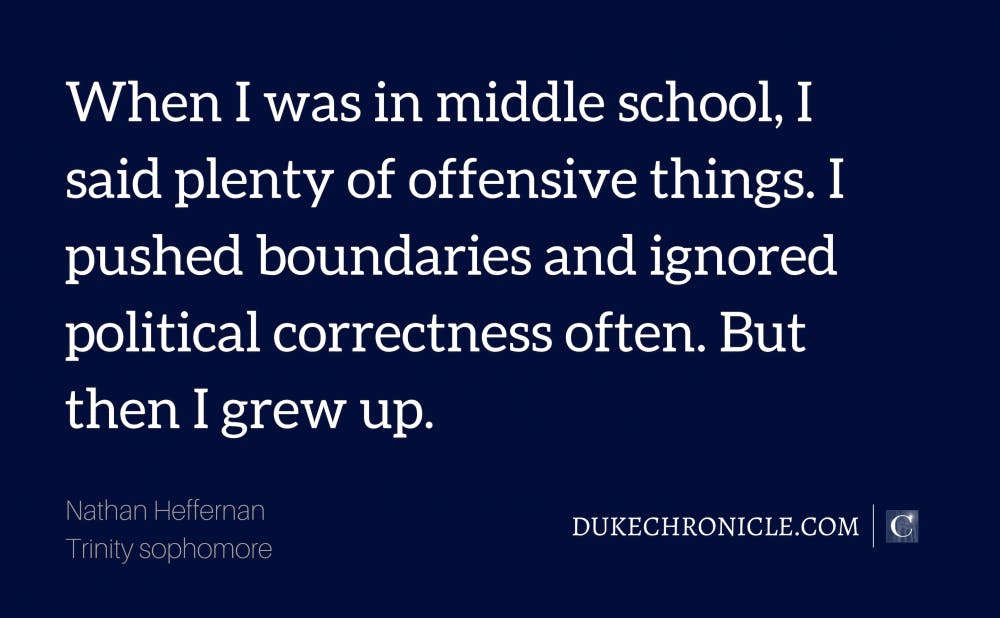In the past few years, anti-politically correct (PC) movements have grown in popularity and vigor. Groups of young college conservatives have criticized the liberal hold on universities and conservative activists have mocked censorship and “sensitivity” among young millennials. The sentiment that “people get offended by anything these days” seems to be growing among the larger population. Scandals of comedians getting booted from gigs for racially insensitive remarks or being fired from hosting an awards ceremony due to old homophobic tweets have sparked discussion over whether PC culture has gone too far. Even at Duke, students and professors complain about the PC culture on campus.
Politically correct means non-offensive and non-controversial. As racial minorities and niches of LGBT communities gain political clout, the amount of identity factors that we are exposed to increases. Some appreciate this diversity, while others see this diversity as more people they can’t offend. The anti-PC culture of arguing that “people get offended too easily” shifts blame on an individual’s surroundings, and away from the individual who was offensive or careless with their words. It makes political correctness seem like society’s flaw, and that the individual holds no responsibility for their words and how their words make people feel.
I view political correctness as an opportunity to connect to a broader range of people. I do not see it as a restriction. My life experiences have not specifically taught me the struggles of other racial, sexual, and gender minorities. However, I do know respectful language, or PC terms, that members of certain communities ask outsiders to use. In an institution such as Duke, we are surrounded by an extremely diverse population. Through being politically correct, I can make my words accessible to and respectful of a larger amount of my peers at Duke, instead of solely people with similar life experiences to mine.
Being ignorant to different identities shuts out people from hearing your message, and it dwindles your audience. A few weeks ago, Kevin Hart was dropped from his hosting gig at the Oscars due to a resurfacing of tweets using the word “f*g” as well as a joke about him beating his son up with a dollhouse if he turned out to be gay. Many, including Ellen DeGeneres, defended the comedian, arguing that these were old jokes from years ago.
The issue was not that society had somehow decided to be offended by Kevin Hart. Rather, Kevin Hart decided in those years to exclude gay people from his audience by making them the target of those jokes. He lost that community as a potential fan base as a direct result of his choice to make homophobic comments.
When I was in middle school, I said plenty of offensive things. I pushed boundaries and ignored political correctness often. But then I grew up. I learned about the experiences of people different me. And I didn’t become politically correct because society or this "liberal university" pressured me, but because I gained more empathy for certain communities. I dropped about 10-12 words from vocabulary, including words like “retarded” and “ghetto.” I have not lost any ability to communicate my ideas or thoughts from my political correctness. I still make mistakes, but with good intentions I never feel like I have to worry.
I understand that it can be difficult to use the correct vocabulary in an academic environment focused on social justice. I also believe that criticisms of political correctness are borne out of a nostalgia for past eras where racist, sexist and homophobic comment were more commonplace. It is important for us to take ownership of our words, and understand that our message reaches the audiences we choose for it.
I don’t want people to monitor their language to fit within a societal rule book. Instead, I want us to understand the perspective of affinity groups and learn how our words impact their communities. This way, we can implement socially conscious language from a genuine desire to be more respectful, rather than an obligation to adhere to a set of rules.
Learning to be non-offensive takes patience. People will get angry at you for things you have been saying for your entire life. Instead of resorting to defensiveness, try to understand where their anger is coming from. For minority groups, this anger can come directly from life experiences. It takes a strong will to step back and realize that what you have said is truly hurtful, and it is easy to dismiss others’ anger as a societal flaw. But when you learn to re-evaluate your words in that way, you expand your own opportunities for knowledge.
Nathan Heffernan is a Trinity sophomore. His column runs on alternate Wednesdays.
Get The Chronicle straight to your inbox
Signup for our weekly newsletter. Cancel at any time.

